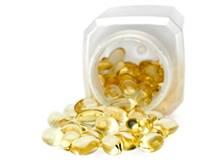User login
Current evidence is still insufficient to adequately assess whether taking vitamin supplements to prevent cardiovascular disease or cancer is beneficial or harmful, according to a recommendation statement issued by the U.S. Preventive Services Task Force and published online Feb. 24 in Annals of Internal Medicine.
This update of the 2003 USPSTF recommendation on vitamin supplementation to prevent CVD or cancer is based on a close review of 4 randomized controlled trials and 1 cohort study of multivitamins, as well as 24 studies of individual vitamins, minerals, or nutrient pairs. The USPSTF concluded that for the general adult population, there still isn’t enough evidence either for or against multivitamins, individual vitamins and minerals, or nutrient pairs. However, there are two exceptions: The task force clearly recommends against the use of beta-carotene and vitamin E as preventives, said Dr. Virginia A. Moyer, chair of the task force at the time this recommendation was finalized and a vice president of the American Board of Pediatrics, and her associates.
The recommendation applies to healthy adults only, not to children, women who are pregnant or may become pregnant, or people who are hospitalized, have chronic illness, or have known nutritional deficiency.
The statement noted that the use of vitamin supplements is common among American adults, with annual sales reaching $28.1 billion in 2010. Many supplements are promoted as preventing heart disease and cancer, and industry-sponsored surveys indicate that many physicians and nurses recommend them to patients (Ann. Intern. Med. 2014 Feb. 24).
Like the USPSTF, the National Institutes of Health also has concluded that the evidence is insufficient to recommend for or against the use of multivitamins to prevent chronic disease. In addition, the Academy of Nutrition and Dietetics has stated that there is no evidence that vitamin supplements are effective at preventing chronic disease, and neither the American Cancer Society nor the American Institute for Cancer Research supports their use. The position of the American Heart Association and the American Academy of Family Physicians also is consistent with that of the USPSTF, Dr. Moyer and her associates said.
No financial conflicts of interest were reported.
Current evidence is still insufficient to adequately assess whether taking vitamin supplements to prevent cardiovascular disease or cancer is beneficial or harmful, according to a recommendation statement issued by the U.S. Preventive Services Task Force and published online Feb. 24 in Annals of Internal Medicine.
This update of the 2003 USPSTF recommendation on vitamin supplementation to prevent CVD or cancer is based on a close review of 4 randomized controlled trials and 1 cohort study of multivitamins, as well as 24 studies of individual vitamins, minerals, or nutrient pairs. The USPSTF concluded that for the general adult population, there still isn’t enough evidence either for or against multivitamins, individual vitamins and minerals, or nutrient pairs. However, there are two exceptions: The task force clearly recommends against the use of beta-carotene and vitamin E as preventives, said Dr. Virginia A. Moyer, chair of the task force at the time this recommendation was finalized and a vice president of the American Board of Pediatrics, and her associates.
The recommendation applies to healthy adults only, not to children, women who are pregnant or may become pregnant, or people who are hospitalized, have chronic illness, or have known nutritional deficiency.
The statement noted that the use of vitamin supplements is common among American adults, with annual sales reaching $28.1 billion in 2010. Many supplements are promoted as preventing heart disease and cancer, and industry-sponsored surveys indicate that many physicians and nurses recommend them to patients (Ann. Intern. Med. 2014 Feb. 24).
Like the USPSTF, the National Institutes of Health also has concluded that the evidence is insufficient to recommend for or against the use of multivitamins to prevent chronic disease. In addition, the Academy of Nutrition and Dietetics has stated that there is no evidence that vitamin supplements are effective at preventing chronic disease, and neither the American Cancer Society nor the American Institute for Cancer Research supports their use. The position of the American Heart Association and the American Academy of Family Physicians also is consistent with that of the USPSTF, Dr. Moyer and her associates said.
No financial conflicts of interest were reported.
Current evidence is still insufficient to adequately assess whether taking vitamin supplements to prevent cardiovascular disease or cancer is beneficial or harmful, according to a recommendation statement issued by the U.S. Preventive Services Task Force and published online Feb. 24 in Annals of Internal Medicine.
This update of the 2003 USPSTF recommendation on vitamin supplementation to prevent CVD or cancer is based on a close review of 4 randomized controlled trials and 1 cohort study of multivitamins, as well as 24 studies of individual vitamins, minerals, or nutrient pairs. The USPSTF concluded that for the general adult population, there still isn’t enough evidence either for or against multivitamins, individual vitamins and minerals, or nutrient pairs. However, there are two exceptions: The task force clearly recommends against the use of beta-carotene and vitamin E as preventives, said Dr. Virginia A. Moyer, chair of the task force at the time this recommendation was finalized and a vice president of the American Board of Pediatrics, and her associates.
The recommendation applies to healthy adults only, not to children, women who are pregnant or may become pregnant, or people who are hospitalized, have chronic illness, or have known nutritional deficiency.
The statement noted that the use of vitamin supplements is common among American adults, with annual sales reaching $28.1 billion in 2010. Many supplements are promoted as preventing heart disease and cancer, and industry-sponsored surveys indicate that many physicians and nurses recommend them to patients (Ann. Intern. Med. 2014 Feb. 24).
Like the USPSTF, the National Institutes of Health also has concluded that the evidence is insufficient to recommend for or against the use of multivitamins to prevent chronic disease. In addition, the Academy of Nutrition and Dietetics has stated that there is no evidence that vitamin supplements are effective at preventing chronic disease, and neither the American Cancer Society nor the American Institute for Cancer Research supports their use. The position of the American Heart Association and the American Academy of Family Physicians also is consistent with that of the USPSTF, Dr. Moyer and her associates said.
No financial conflicts of interest were reported.
FROM ANNALS OF INTERNAL MEDICINE
Major Finding: Current evidence is still insufficient to recommend for or against the use of multivitamins, individual vitamins and minerals, or pairs of nutrients to prevent cardiovascular disease or cancer, except that beta-carotene and vitamin E are not recommended for this purpose.
Data Source: A detailed review of the literature and a recommendation statement regarding the use of vitamin supplements to prevent cardiovascular disease or cancer.
Disclosures: No financial conflicts of interest were reported.

